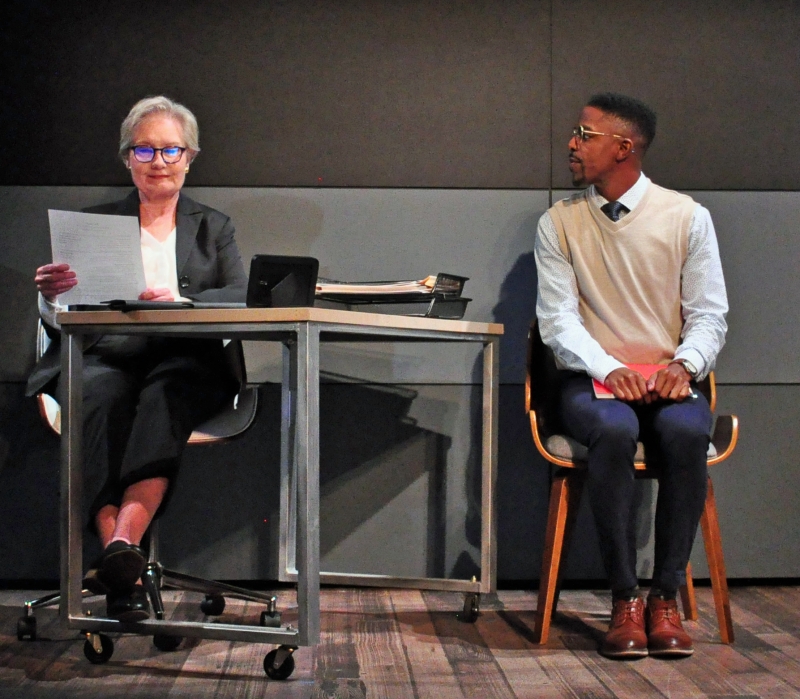
with Director Vanessa Severo from Unicorn Theatre's "Lifespan of a Fact"
Unicorn Theatre Artistic Director Cynthia Levin enthusiastically welcomed a properly vaccinated, masked, and socially distanced audience to the Levin Theater for the first Covid delayed Unicorn production in eighteen months. The play is a dense, but extremely well performed ninety minute one act entitled "The Lifespan of a Fact."

As someone who spent half a century in publishing arguing with editors and writers, "Lifespan" has a special resonance for me. The premise lives as somewhat of a conundrum. I cannot help but be put in mind of the immortal 1939 observation by former UK Prime Minister Winston Churchill about his ability to forecast the actions of the Russian state. "It is a riddle, wrapped in a mystery, inside an enigma, but perhaps there is a key," he said. And so it goes with this play.
You will enjoy the witty dialogue, back and forth banter, presentation of opposing views, and insightful characterizations, but any conclusion will be left to float to your own personal ether. I hugely enjoyed the performances of the three actors, appreciated the production values of the stage settings, and admired the directorial discretion shown by this production's titular captain Vanessa Severo.
Confused yet? I kind of am too. So are most reviewers in places where "Lifespan" has been performed.

John D'Agata (played sardonically by Mark Robbins) and Jim Fingal (played earnestly by Donavan Woods), the main characters in this piece, are real people. John is an essayist. Jim is a fact checker, recent Harvard graduate, and later a founder of "Logic" magazine. The third character in the piece is the editor of a New York glossy magazine named Emily Penrose (played capably by Peggy Friesen). She is an invention created to keep the actual people from killing each other.
John very much denies being a Journalist. To John, fact is beside the point of emotional truth. Jim sees fact as the revealer of truth. Jim is assigned to fact check a fifteen page essay by John for a magazine. The subject is the actual suicide of a Las Vegas teenager named Levi S. Presley in 2002. Jim quickly discovers that almost nothing that John has alleged in the article is true. The back and forth between the two of them lasted about seven years.
Somehow, they realized that their argument might make a good book. The resulting volume co-authored by John and Jim is something akin to a grudge match at one of the Wrestle-manias
Moving ever onward, three playwrights, Jeremy Kereken, David Murrell, and Gordon Ferrrell, joined together to turn a book about fact and truthfulness (in which the authors admitted they had fictionalized themselves) into a very funny one act play that fictionalized the already fictionalized real people into even more comic caricatures of themselves. Refereeing the conflict is the invented editor called Emily Penrose. She understands the problems inherent to the publishing business and the push and pull of the editor by new corporate owners. It is a fun device. Unfortunately, the play doesn't take us anywhere except to pose the conundrum.
The problem for anyone who has ever signed a contract to provide a non-fiction piece for publication is that no editor worth his or her salt could ever accept the proposition on which John D'Agata bases his argument. It is especially not acceptable in today's political climate. Today's computers will find your exaggerations and plagiary in a heartbeat.

Worse, on social media, your imagined version of the truth will be believed by about a third of those exposed to it who don't know how to search out the actual. Pretty soon, folks will believe that a political party is running a sex trafficking ring out of the basement of a District of Columbia pizza parlor that happens to be built on a slab.
A former writer and author at the Washington Post named Alan Barth from the mid part of the last century called "Journalism the first rough draft of history." He was right.
A century earlier, a young man from Missouri named Samuel Langhorne Clemens swindled his way onto the first multi-month pleasure cruise of the Holy Land aboard the U.S.S. Quaker City as a travel writer for the Daily Alta of San Francisco. Samuel, also known as Mark Twain, had a vivid imagination and historians are still attempting to unwind his imaginings from his actual journeys.
"The Lifespan of a Fact" is clever and dynamic as situation comedy. Enjoy it as such. The true "Lifespan of a Fact" can be a fleeting as the existence of a particle of anti-matter or as enduring as Emilie du Chatelet's first law of the conservation of energy. It can neither be created nor destroyed. We leave it to you decide which is more dangerous in a world infected by Covid-19.
"Lifespan of a Fact" continues its run at the Unicorn through September 26. Tickets are available on the www.unicorn.org website or call 816-531-7529. I recommend you enjoy your time with the enigma thus posed.
Photos courtesy of Unicorn Theatre.
Reader Reviews

Videos

